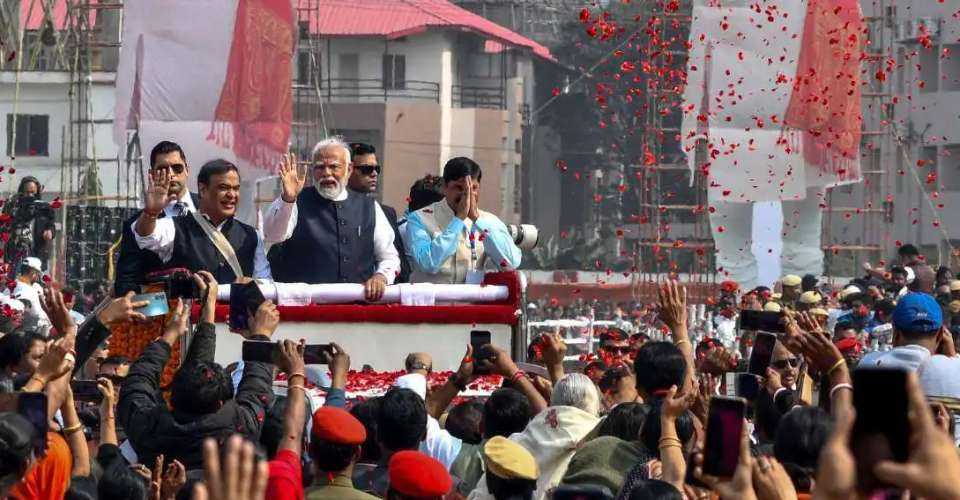
Prime Minister Narendra Modi (center) along with Chief Minister of Assam Himanta Biswa Sarma (center, left) waves to supporters during a public rally in Guwahati on Feb. 4. (Photo: AFP)
By Nirendra Dev
The state government run by the pro-Hindu Bharatiya Janata Party (BJP) wants to repeal the 1935 Muslim Marriage and Divorce Registration Act and replace it with an already existing Special Marriage Act, applicable to people following no religion.
The 1935 law allows Muslims to register marriage even if the bride and groom have not reached the legal ages of 18 and 21. It also gives legal protection to Muslim husbands, who unilaterally divorce wives by just saying “divorce” thrice. The government wants to end this.
“This move [repealing of the old law] marks another significant step towards prohibiting child marriages in Assam,” state chief minister Himanta Biswa Sarma, a BJP leader, wrote on social media.
Although the declared aim is to fight child marriage, the politically motivated move aims to polarize Muslims and Hindus ahead of parliamentary elections, say Muslim leaders and other political rivals.
BJP leader Prime Minister Narendra Modi is seeking a hat-trick and is ambitious to win at least 370 seats of the 545 seats in the lower House of Indian Parliament in elections due in April.
Assam Chief Minister Himanta had wanted to introduce the controversial Uniform Civil Code, a law to standardize personal laws of all religious communities. BJP-ruled Uttarakhand in north India has already passed a Bill to introduce UCC in the state.
The move to repeal the law related to Muslim marriage is seen as a crucial step toward enforcing the uniform civil code in the state.
“The timing of the move could be debated. But the 1935 law was quite informal and it allowed Kazis (Muslim marriage registrars) to misuse their powers, and even helped unacceptable practices like child marriages and divorce without established grounds,” said Tushar Bhadra in Varanasi, Modi’s parliamentary constituency,
But others say replacing the old Muslim Act with the Special Marriage Act will not ensure better compliance.
“The state government could have simply amended the sections enabling underage registration, rather than abolishing the Act entirely. Who knows the new system may only lead to more unregistered marriages including minors,” Assam-based Ashutosh Talukdar said.
Congress leader Aman Wadud in Assam agrees.
Under the already existing Special Marriage Act, district commissioners and official registrars in each district “will take custody of registration records” of marriages. The new system will also render powerless all the 94 Muslim Marriage Registrars or Kazis.
“The BJP has argued that this will completely eradicate child marriages. But this will only increase the number of unauthorized child marriages,” Wadud said.
Assam’s religious demography is important to understand the move that comes on the eve of national polls. Muslims make up about 34 percent of Assam’s 31 million population, as per the 2011 Census, and are politically powerful in some pockets.
The state has 14 parliamentary seats and in some of them, Muslim votes can be decisive. The BJP aims to consolidate Hindu votes for itself.
In January, Modi’s rival Congress leader Rahul Gandhi toured parts of Assam, mostly Muslim areas and hence the BJP’s move is also seen as an attempt to checkmate Congress’ electoral strategy.
Polarisation will swing votes in favor of the BJP and the Muslim voters may develop cold feet even to vote in the state, where religion has been influencing politics since the 1980s.
In the eighties, Assam students protested for months on the streets against the infiltration of “Bangladeshi Muslims.”
The BJP government since 2016, when it first came to power in the state, has been trying to make a “distinction” between the Bengali-speaking Muslims and the indigenous Assamese Muslims. This, political observers say, has politically helped the Hindu party grow.
Bangladeshi Muslims have reportedly spread into pockets such as Silchar, Karimganj, Nagon, and Dhubri areas of Assam. They can influence the outcome of at least five of the 14 parliamentary seats. Such is their numerical strengths.
The BJP also brought in a National Register of Citizens (NRC) and the Citizens Amendment Act (CAA), which, as BJP leaders say, aimed at granting citizenship to “non-Muslims” including Hindus, Sikhs, Christians, Parsis, Jains, and Buddhists – who fled Bangladesh, Pakistan, and Afghanistan in the face of religious persecution.
“The CAA is meant to give citizenship and never to take it away either from Muslims or any other social and religious group,” federal Home Minister Amit Shah said in Delhi last month at a media conference.
The state’s Assamese-speaking Muslims have always struggled for a distinct identity of their own. In places, the cultural practices of Bengali Muslims dominate even their lifestyles.
The Assam government sensed this uneasiness and last year, did a study to gauge the socio-economic conditions of the indigenous Muslims of Assam.
“This was a clear bid to distinguish the Bengali-speaking Muslims and Assam’s indigenous Muslims. If you remember, the Assam chief minister also said the BJP will not need votes from the Bengali Muslims of Assam,” points out Congress leader Sanjay Das in neighboring Meghalaya.
Many others see BJP’s moves are crystal clear attempts to drive a wedge between Bengali and Assamese Muslims in Assam.
Source UCA News
